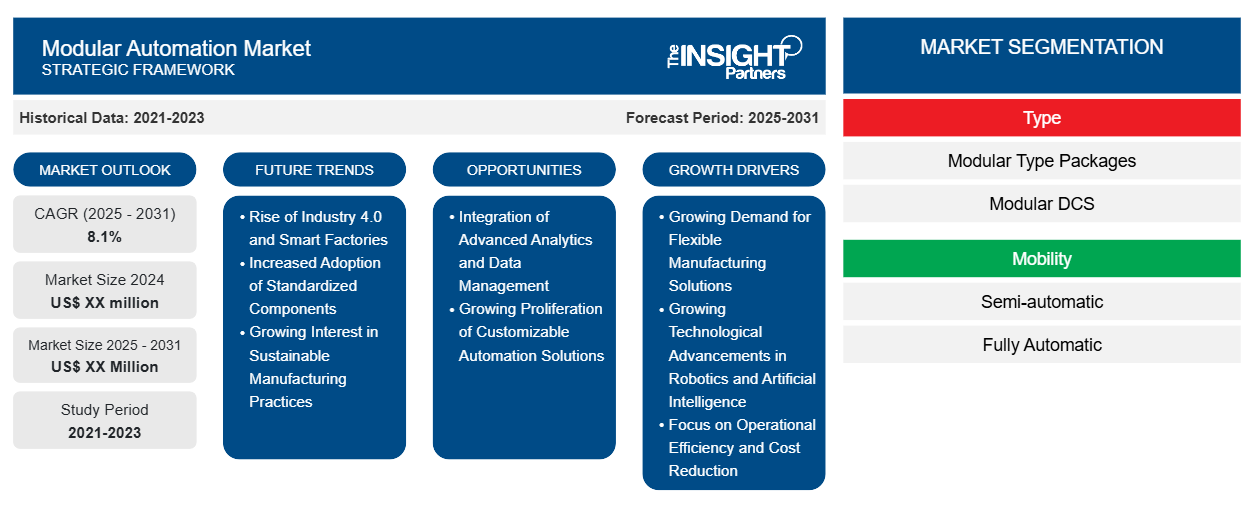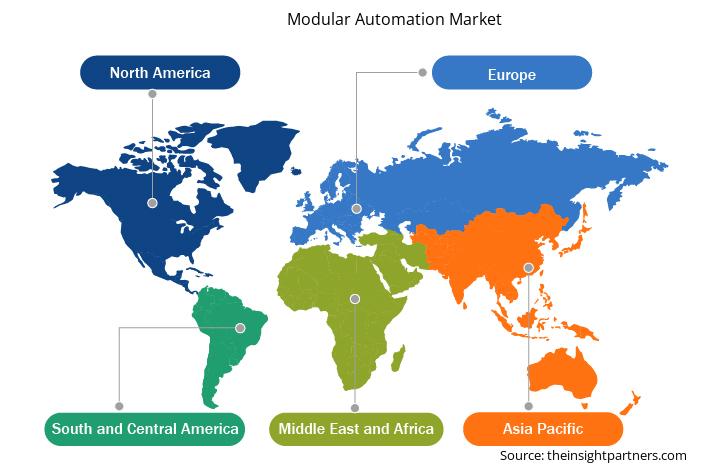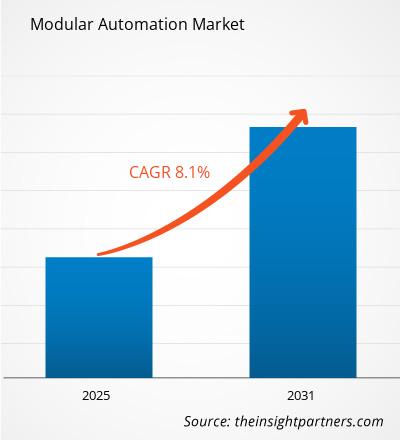The Modular Automation Market is expected to register a CAGR of 8.1% from 2025 to 2031, with a market size expanding from US$ XX million in 2024 to US$ XX Million by 2031.
The report is segmented by Type (Modular Type Packages, Modular DCS), Mobility (Semi-automatic, Fully Automatic), Component (Robot Controllers, I/O Modules, Drives & Motors, Sensors & Actuators, Safety), End-user Industry (Pharmaceutical, Chemical, Food and Beverage, Logistics and Warehousing, Others). The global analysis is further broken-down at regional level and major countries. The Report Offers the Value in USD for the above analysis and segments.
Purpose of the Report
The report Modular Automation Market by The Insight Partners aims to describe the present landscape and future growth, top driving factors, challenges, and opportunities. This will provide insights to various business stakeholders, such as:
- Technology Providers/Manufacturers: To understand the evolving market dynamics and know the potential growth opportunities, enabling them to make informed strategic decisions.
- Investors: To conduct a comprehensive trend analysis regarding the market growth rate, market financial projections, and opportunities that exist across the value chain.
- Regulatory bodies: To regulate policies and police activities in the market with the aim of minimizing abuse, preserving investor trust and confidence, and upholding the integrity and stability of the market.
Modular Automation Market Segmentation
Type
- Modular Type Packages
- Modular DCS
Mobility
- Semi-automatic
- Fully Automatic
Component
- Robot Controllers
- I/O Modules
- Drives & Motors
- Sensors & Actuators
- Safety
End-user Industry
- Pharmaceutical
- Chemical
- Food and Beverage
- Logistics and Warehousing
You will get customization on any report - free of charge - including parts of this report, or country-level analysis, Excel Data pack, as well as avail great offers and discounts for start-ups & universities
Modular Automation Market: Strategic Insights

- Get Top Key Market Trends of this report.This FREE sample will include data analysis, ranging from market trends to estimates and forecasts.
Modular Automation Market Growth Drivers
- Growing Demand for Flexible Manufacturing Solutions: The modular automation market is significantly driven by the increasing need for flexible manufacturing systems that can adapt to changing production requirements. Industries are seeking ways to enhance operational efficiency and reduce downtime. Modular automation allows for quick reconfiguration of production lines and equipment, enabling manufacturers to respond swiftly to market demands, product variations, and fluctuating consumer preferences. This adaptability is essential for companies looking to maintain a competitive edge in today’s dynamic market landscape.
- Growing Technological Advancements in Robotics and Artificial Intelligence: Rapid advancements in robotics, artificial intelligence (AI), and machine learning are propelling the modular automation market forward. Innovations in these technologies enable the development of smarter, more autonomous modular systems capable of performing complex tasks with minimal human intervention. The integration of intelligent algorithms enhances process optimization, predictive maintenance, and quality control, leading to improved productivity and reduced operational costs. As these technologies continue to evolve, they will further drive the adoption of modular automation solutions across various industries.
- Focus on Operational Efficiency and Cost Reduction: With increasing pressure to optimize production processes and reduce costs, businesses are turning to modular automation as a viable solution. Modular systems offer scalability, allowing companies to invest incrementally in automation rather than committing to large, fixed systems. This flexibility helps organizations to minimize capital expenditure while maximizing returns on investment. Moreover, the ability to streamline workflows and automate repetitive tasks enhances overall operational efficiency, making modular automation an attractive option for businesses aiming to improve their bottom line.
Modular Automation Market Future Trends
- Rise of Industry 4.0 and Smart Factories: The modular automation market is witnessing a significant trend towards Industry 4.0, characterized by the integration of IoT (Internet of Things) technologies and smart factory concepts. This trend emphasizes real-time data exchange and connectivity between machines, systems, and human operators. Modular automation systems are increasingly designed to be compatible with IoT devices, enabling greater visibility and control over production processes. As organizations strive to implement smart factories, the demand for modular automation solutions that facilitate this transition is expected to grow.
- Increased Adoption of Standardized Components: A prominent trend within the modular automation market is the move towards standardized components and systems. Standardization reduces complexity and enhances compatibility among different automation solutions, making it easier for manufacturers to integrate various systems into their operations. This trend not only streamlines the design and implementation processes but also allows for easier maintenance and upgrades. As companies prioritize efficient and cost-effective automation solutions, the demand for modular systems featuring standardized components is likely to rise.
- Growing Interest in Sustainable Manufacturing Practices: As sustainability becomes a key focus for industries, the modular automation market is adapting to meet these environmental goals. Modular automation solutions are often designed to optimize resource usage, reduce waste, and lower energy consumption, aligning with sustainable manufacturing practices. Companies are increasingly recognizing the importance of eco-friendly operations, leading to a trend where modular automation is leveraged to achieve both operational efficiency and sustainability targets. This dual focus enhances the appeal of modular systems in various sectors.
Modular Automation Market Opportunities
- Integration of Advanced Analytics and Data Management: As businesses seek to harness data for better decision-making, there is a growing opportunity for modular automation solutions that incorporate advanced analytics and data management capabilities. By integrating data analysis into modular systems, companies can gain insights into production performance, identify bottlenecks, and optimize processes. This trend towards data-driven automation solutions presents a lucrative opportunity for developers to create innovative modular systems that enhance operational efficiency and support continuous improvement initiatives.
- Growing Proliferation of Customizable Automation Solutions: The demand for highly customizable automation solutions is on the rise, providing a significant opportunity for players in the modular automation market. Organizations are looking for automation systems that can be tailored to their specific needs, allowing for greater flexibility and efficiency in production processes. By offering modular automation solutions that can be easily customized and configured according to unique requirements, companies can capture a larger share of the market and foster long-term customer relationships through enhanced service offerings.
Modular Automation Market Regional Insights
The regional trends and factors influencing the Modular Automation Market throughout the forecast period have been thoroughly explained by the analysts at The Insight Partners. This section also discusses Modular Automation Market segments and geography across North America, Europe, Asia Pacific, Middle East and Africa, and South and Central America.

- Get the Regional Specific Data for Modular Automation Market
Modular Automation Market Report Scope
| Report Attribute | Details |
|---|---|
| Market size in 2024 | US$ XX million |
| Market Size by 2031 | US$ XX Million |
| Global CAGR (2025 - 2031) | 8.1% |
| Historical Data | 2021-2023 |
| Forecast period | 2025-2031 |
| Segments Covered |
By Type
|
| Regions and Countries Covered | North America
|
| Market leaders and key company profiles |
Modular Automation Market Players Density: Understanding Its Impact on Business Dynamics
The Modular Automation Market is growing rapidly, driven by increasing end-user demand due to factors such as evolving consumer preferences, technological advancements, and greater awareness of the product's benefits. As demand rises, businesses are expanding their offerings, innovating to meet consumer needs, and capitalizing on emerging trends, which further fuels market growth.
Market players density refers to the distribution of firms or companies operating within a particular market or industry. It indicates how many competitors (market players) are present in a given market space relative to its size or total market value.
Major Companies operating in the Modular Automation Market are:
- ABB
- Siemens
- Festo Inc
- Yokogawa Electric
- HIMA
Disclaimer: The companies listed above are not ranked in any particular order.

- Get the Modular Automation Market top key players overview
Key Selling Points
- Comprehensive Coverage: The report comprehensively covers the analysis of products, services, types, and end users of the Modular Automation Market, providing a holistic landscape.
- Expert Analysis: The report is compiled based on the in-depth understanding of industry experts and analysts.
- Up-to-date Information: The report assures business relevance due to its coverage of recent information and data trends.
- Customization Options: This report can be customized to cater to specific client requirements and suit the business strategies aptly.
The research report on the Modular Automation Market can, therefore, help spearhead the trail of decoding and understanding the industry scenario and growth prospects. Although there can be a few valid concerns, the overall benefits of this report tend to outweigh the disadvantages.
Frequently Asked Questions
What are the deliverable formats of the Modular Automation Market report?
The report can be delivered in PDF/PPT format; we can also share excel dataset based on the request.
Which are the leading players operating in the Modular Automation Market
The leading players operating in the Modular Automation Market include ABB, Siemens, Festo Inc, Yokogawa Electric, HIMA, Ginolis, Inniti, Innovative Automation Pvt. Ltd., Sojka Automation GmbH, Messung Industrial Automation & Controls
What is the future trend of the Modular Automation Market?
Rise of Industry 4.0 and Smart Factories, Increased Adoption of Standardized Components, Growing Interest in Sustainable Manufacturing Practices is the key future trend of the Modular Automation Market.
What are the driving factors impacting the global Modular Automation Market?
The major factors driving the Modular Automation Market is Growing Demand for Flexible Manufacturing Solutions, Technological Advancements in Robotics and Artificial Intelligence, Focus on Operational Efficiency and Cost Reduction.
What is the expected CAGR of the Modular Automation Market?
The global Modular Automation Market is expected to grow at a CAGR of 8.1% during the forecast period 2024 - 2031.
- Historical Analysis (2 Years), Base Year, Forecast (7 Years) with CAGR
- PEST and SWOT Analysis
- Market Size Value / Volume - Global, Regional, Country
- Industry and Competitive Landscape
- Excel Dataset
- Parking Meter Apps Market
- eSIM Market
- Advanced Distributed Management System Market
- Online Exam Proctoring Market
- Electronic Data Interchange Market
- Barcode Software Market
- Maritime Analytics Market
- Cloud Manufacturing Execution System (MES) Market
- Robotic Process Automation Market
- Digital Signature Market
Testimonials
Reason to Buy
- Informed Decision-Making
- Understanding Market Dynamics
- Competitive Analysis
- Identifying Emerging Markets
- Customer Insights
- Market Forecasts
- Risk Mitigation
- Boosting Operational Efficiency
- Strategic Planning
- Investment Justification
- Tracking Industry Innovations
- Aligning with Regulatory Trends
Yes! We provide a free sample of the report, which includes Report Scope (Table of Contents), report structure, and selected insights to help you assess the value of the full report. Please click on the "Download Sample" button or contact us to receive your copy.
Absolutely — analyst assistance is part of the package. You can connect with our analyst post-purchase to clarify report insights, methodology or discuss how the findings apply to your business needs.
Once your order is successfully placed, you will receive a confirmation email along with your invoice.
• For published reports: You’ll receive access to the report within 4–6 working hours via a secured email sent to your email.
• For upcoming reports: Your order will be recorded as a pre-booking. Our team will share the estimated release date and keep you informed of any updates. As soon as the report is published, it will be delivered to your registered email.
We offer customization options to align the report with your specific objectives. Whether you need deeper insights into a particular region, industry segment, competitor analysis, or data cut, our research team can tailor the report accordingly. Please share your requirements with us, and we’ll be happy to provide a customized proposal or scope.
The report is available in either PDF format or as an Excel dataset, depending on the license you choose.
The PDF version provides the full analysis and visuals in a ready-to-read format. The Excel dataset includes all underlying data tables for easy manipulation and further analysis.
Please review the license options at checkout or contact us to confirm which formats are included with your purchase.
Our payment process is fully secure and PCI-DSS compliant.
We use trusted and encrypted payment gateways to ensure that all transactions are protected with industry-standard SSL encryption. Your payment details are never stored on our servers and are handled securely by certified third-party processors.
You can make your purchase with confidence, knowing your personal and financial information is safe with us.
Yes, we do offer special pricing for bulk purchases.
If you're interested in purchasing multiple reports, we’re happy to provide a customized bundle offer or volume-based discount tailored to your needs. Please contact our sales team with the list of reports you’re considering, and we’ll share a personalized quote.
Yes, absolutely.
Our team is available to help you make an informed decision. Whether you have questions about the report’s scope, methodology, customization options, or which license suits you best, we’re here to assist. Please reach out to us at sales@theinsightpartners.com, and one of our representatives will get in touch promptly.
Yes, a billing invoice will be automatically generated and sent to your registered email upon successful completion of your purchase.
If you need the invoice in a specific format or require additional details (such as company name, GST, or VAT information), feel free to contact us, and we’ll be happy to assist.
Yes, certainly.
If you encounter any difficulties accessing or receiving your report, our support team is ready to assist you. Simply reach out to us via email or live chat with your order information, and we’ll ensure the issue is resolved quickly so you can access your report without interruption.





















 Get Free Sample For
Get Free Sample For